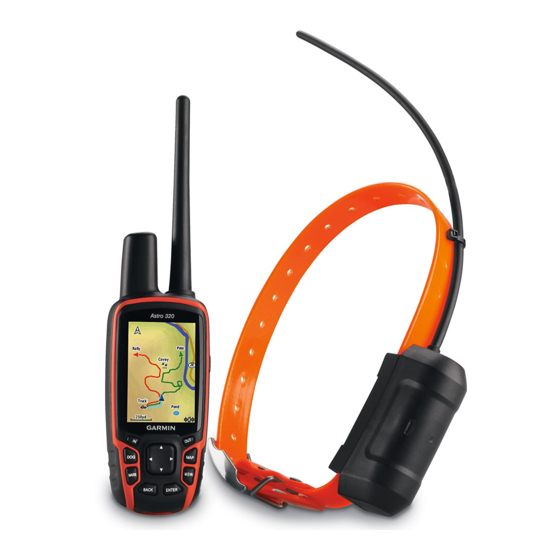• To save part of the track, select Save Portion, and select
the part to save.
Marking a Location on a Saved Track
1
From the main menu, select Tools > Track Manager.
2
Select a track.
3
Select View Map.
4
Select a location on the track.
5
Select MARK > New.
6
Edit the location information (optional).
Navigating to the Start of a Track
You can navigate back to the beginning of a track. This can be
helpful when finding your way back to camp or the trail head.
1
Select Tools > Track Manager > Current Track > View
Map.
2
Select TracBack.
The map page opens with your route marked with a magenta
line.
3
Navigate using the map
(Navigating with the Bearing Pointer, page
Archiving a Track Manually
You can archive saved tracks to save memory space.
1
Select Tools > Track Manager.
2
Select a track.
3
Select Archive.
Archiving Tracks Automatically
1
Select Setup > Tracks > Auto Archive.
2
Select an option.
Sending and Receiving Data Wirelessly
Before you can share data wirelessly, you must be within 10 feet
(3 m) of a compatible Garmin
You can share waypoints, geocaches, routes, and tracks
wirelessly.
1
Select Tools > Share Wirelessly.
2
Select Send or Receive.
3
Follow the on-screen instructions.
Sharing Dog Information
Before you can share dog information with another handheld
device user, the user must enable their handheld device to
receive wirelessly and bring it within range of the sending device
and dog collar device.
1
From the dog tracking page, select DOG.
2
Select a dog.
3
Select Share Wirelessly.
Your device sends the dog name, unit ID, and update rate
information.
Receiving Dog Information
From the dog tracking page, select DOG > MENU > Receive
Wirelessly.
Navigation
You can navigate routes and tracks, to a waypoint, geocache,
photo, or any saved location in the device. You can use the map
or the compass to navigate to your destination.
Map
represents your location on the map. As you travel, the icon
moves and leaves a track log (trail). Waypoint names and
6
(Map, page
6) or the compass
6).
device.
®
symbols appear on the map. When you are navigating to a
destination, your route is marked with a magenta line on the
map.
When the map orientation is Track Up, objects on the map
appear to rotate around your position. As you travel, the entire
map reorients in the direction you are facing. You can stabilize
the objects by setting the orientation to North Up
page
9.
To open the map, select MAP.
Enabling the Map Data Fields
1
Select MAP > MENU > Setup Map > Data Fields.
2
Select an option.
Compass
The handheld device has a 3-axis, tilt-compensated compass.
You can use a bearing pointer or a course pointer to navigate to
your destination.
Calibrating the Compass
NOTE: You must calibrate the electronic compass outdoors. Do
not stand near objects that influence magnetic fields, such as
cars, buildings, or overhead power lines.
The device has a 3-axis electronic compass. You should
calibrate the compass after moving long distances, experiencing
temperature changes, or changing the batteries.
1
Select DOG > MENU.
2
Select Calibrate Compass > Start.
3
Follow the on-screen instructions.
Navigating with the Bearing Pointer
When navigating to a destination,
regardless of the direction you are moving.
1
While navigating to a destination, select Tools > Compass
2
Turn until
points toward the top of the compass, and
continue moving in that direction to the destination.
Course Pointer
The course pointer is most useful if you are navigating on water
or where there are no major obstacles in your path. It can also
help you avoid hazards near the course, such as shoals or
submerged rocks.
To enable the course pointer, from the compass, select MENU >
Setup Heading > Go To Line (Pointer).
The course pointer
indicates your relationship to the course
line leading to the destination. The course deviation indicator
(CDI)
provides the indication of drift (right or left) from the
course. The scale
refers to the distance between dots
the course deviation indicator, which tell you how far off course
you are.
Find Menu
You can use the find menu to search for waypoints, cities, and
coordinates. You can download and navigate to photos, tracks,
and geocaches. Additional categories appear if you have
optional, compatible detailed maps loaded on the device. When
you open a category, the list contains items near your current
location or the map pointer (if active).
(Map Settings,
points to your destination,
on
Navigation

